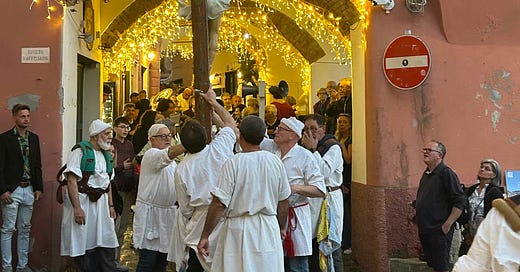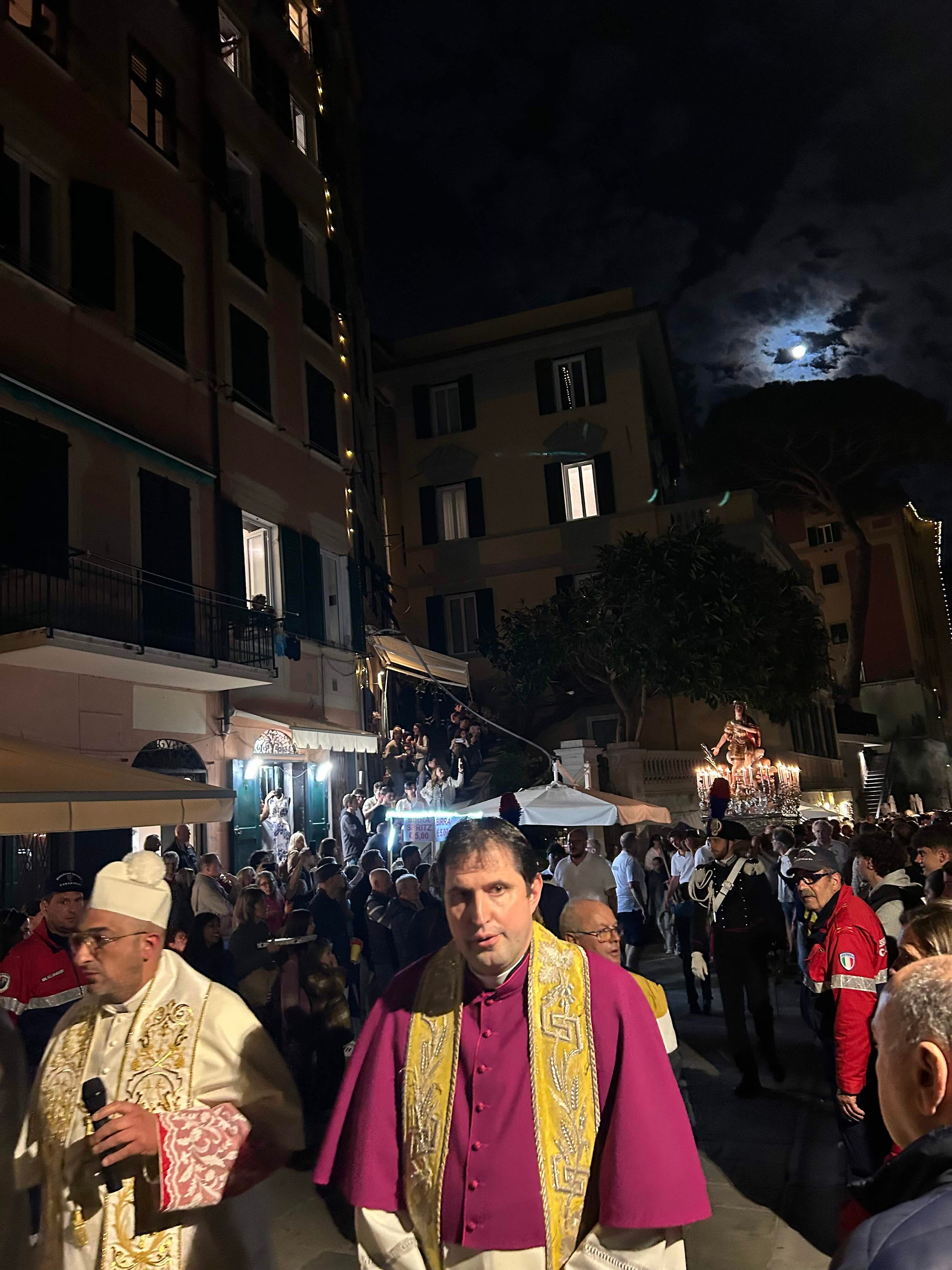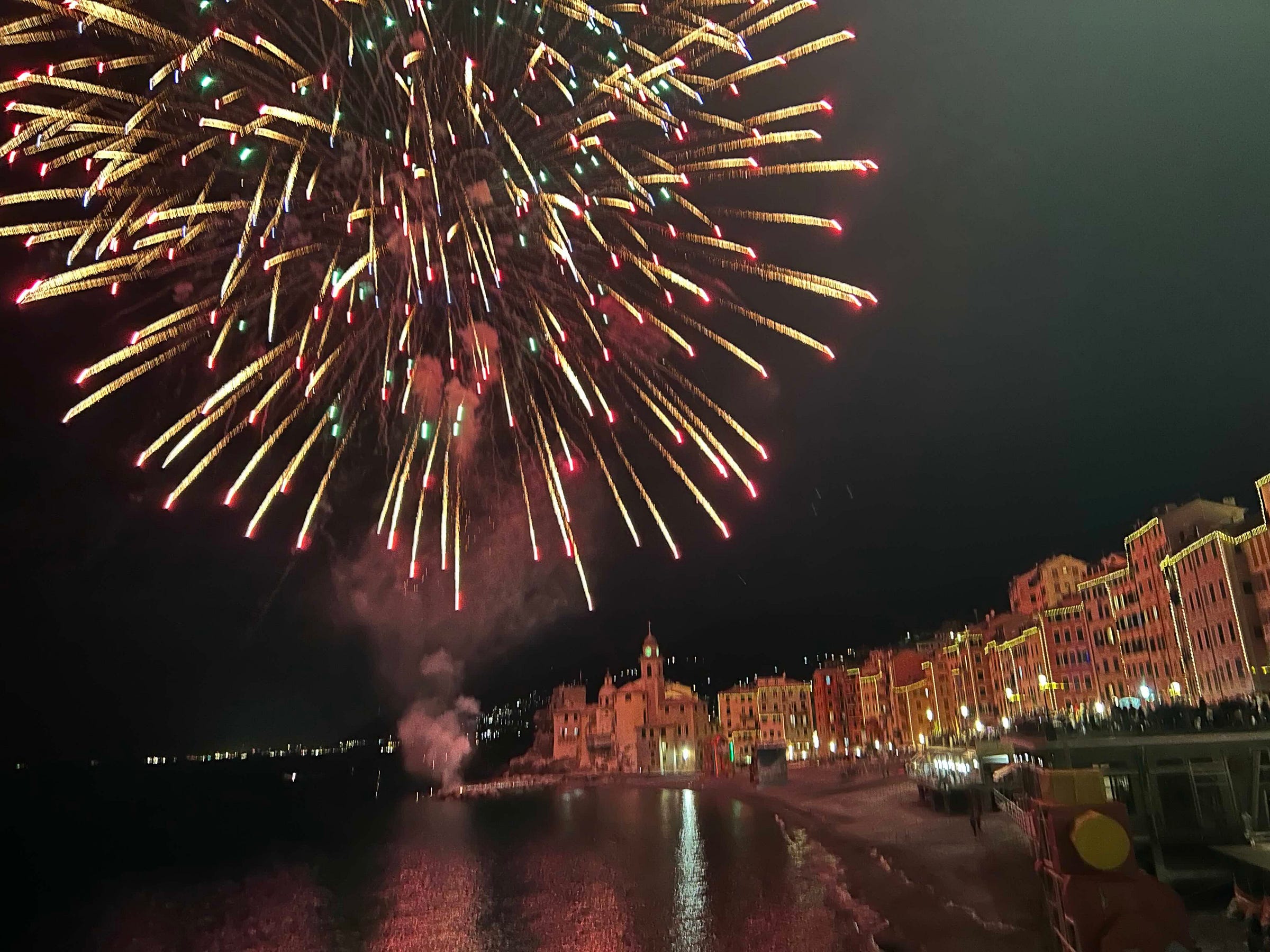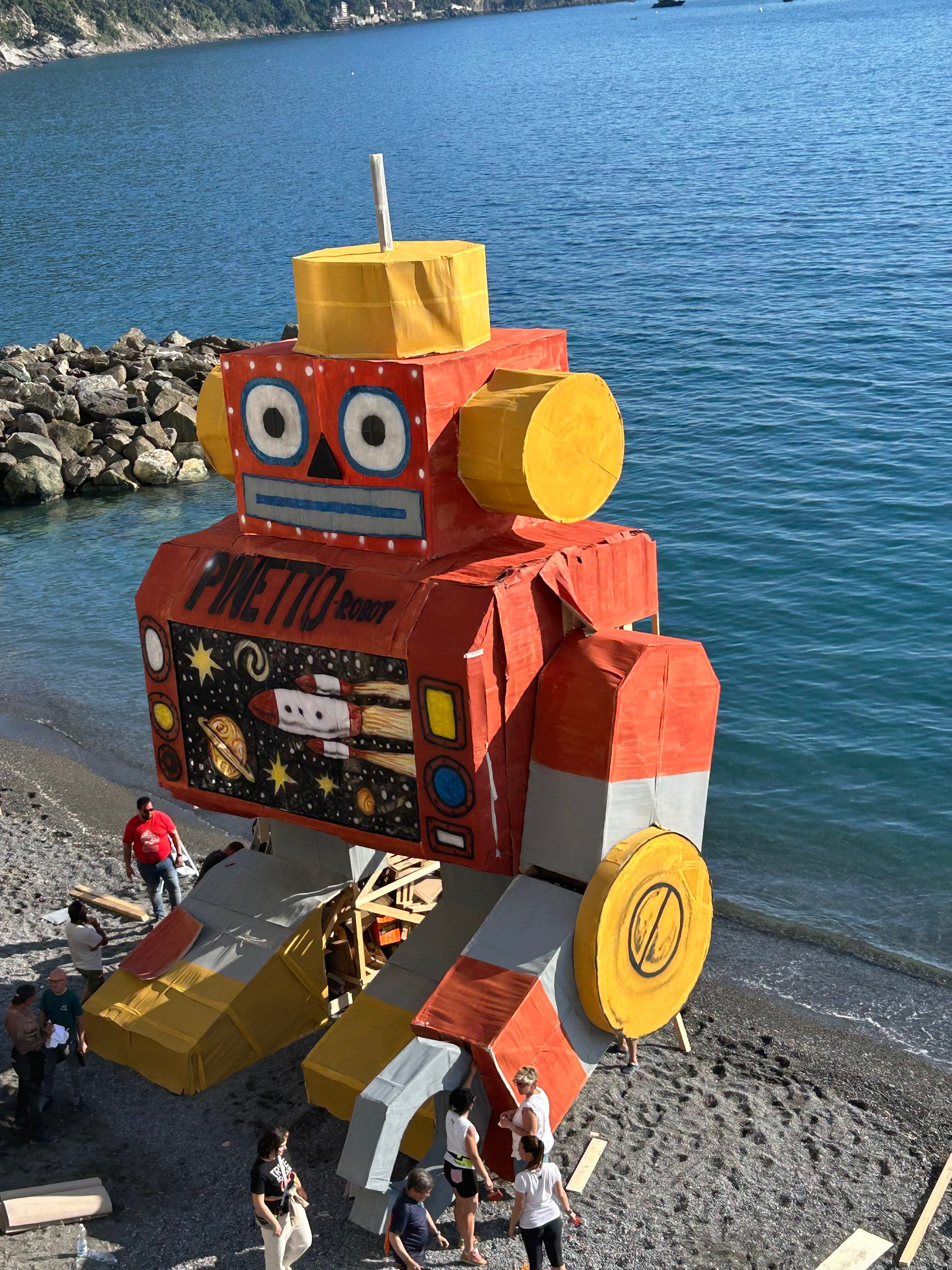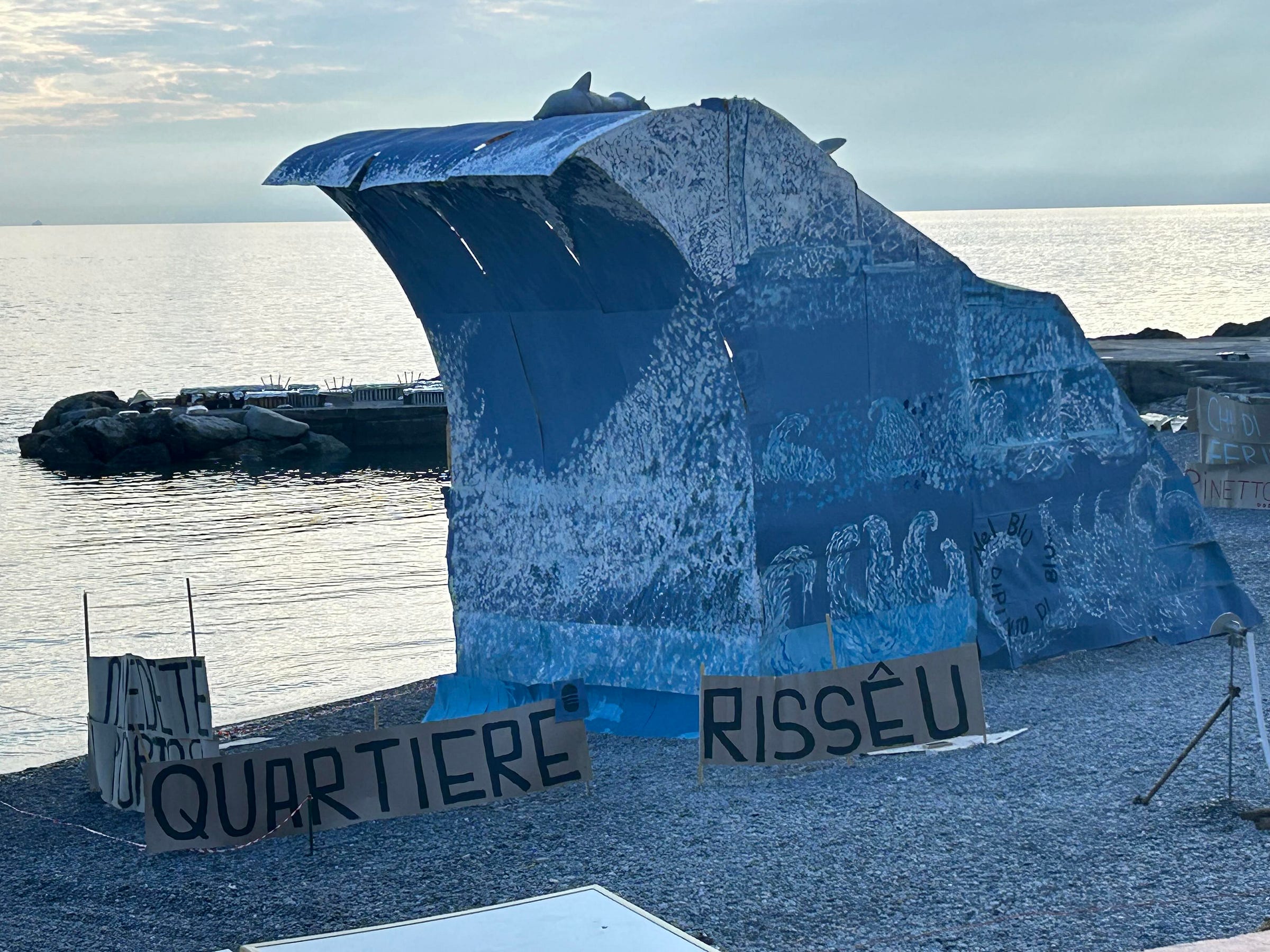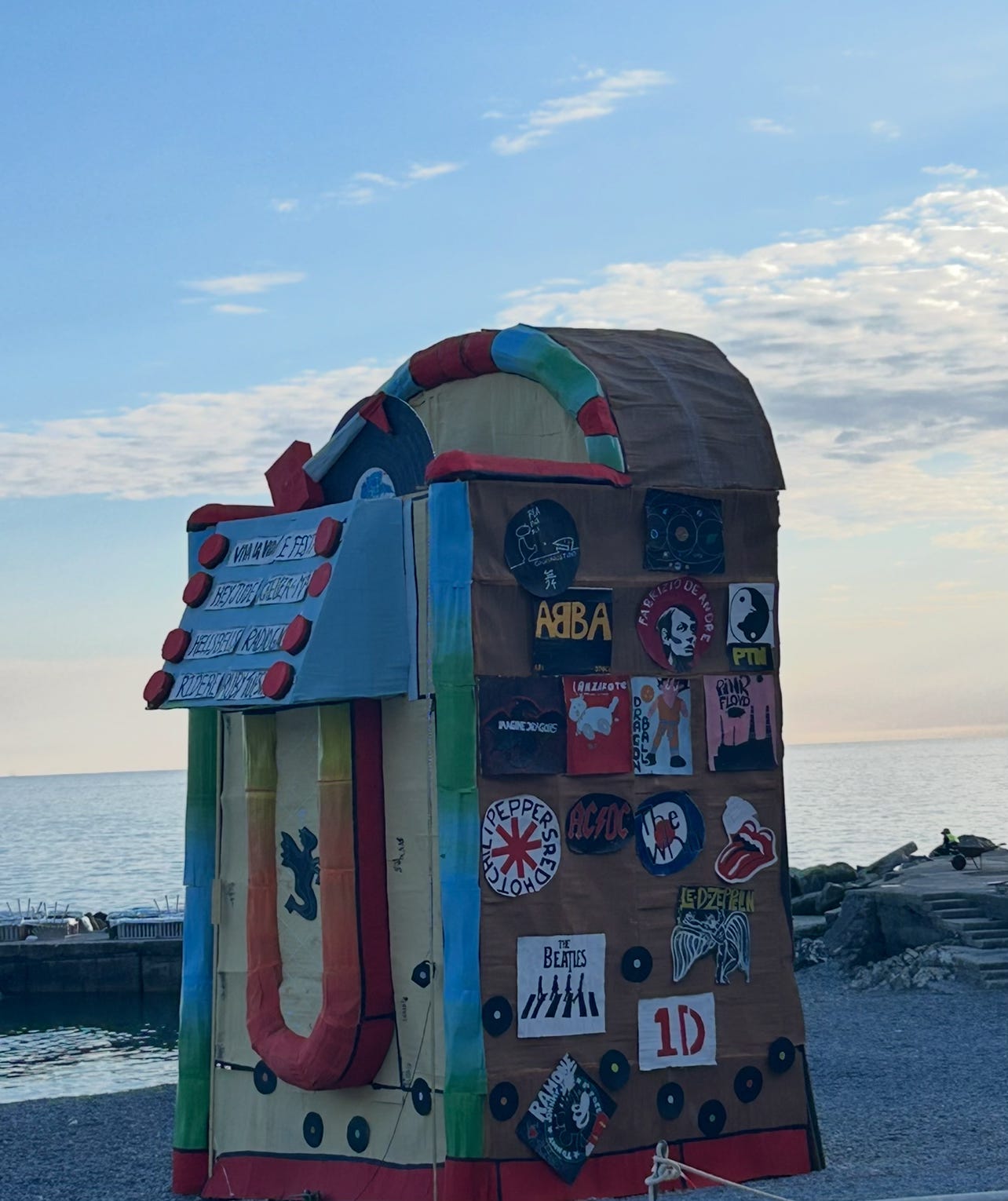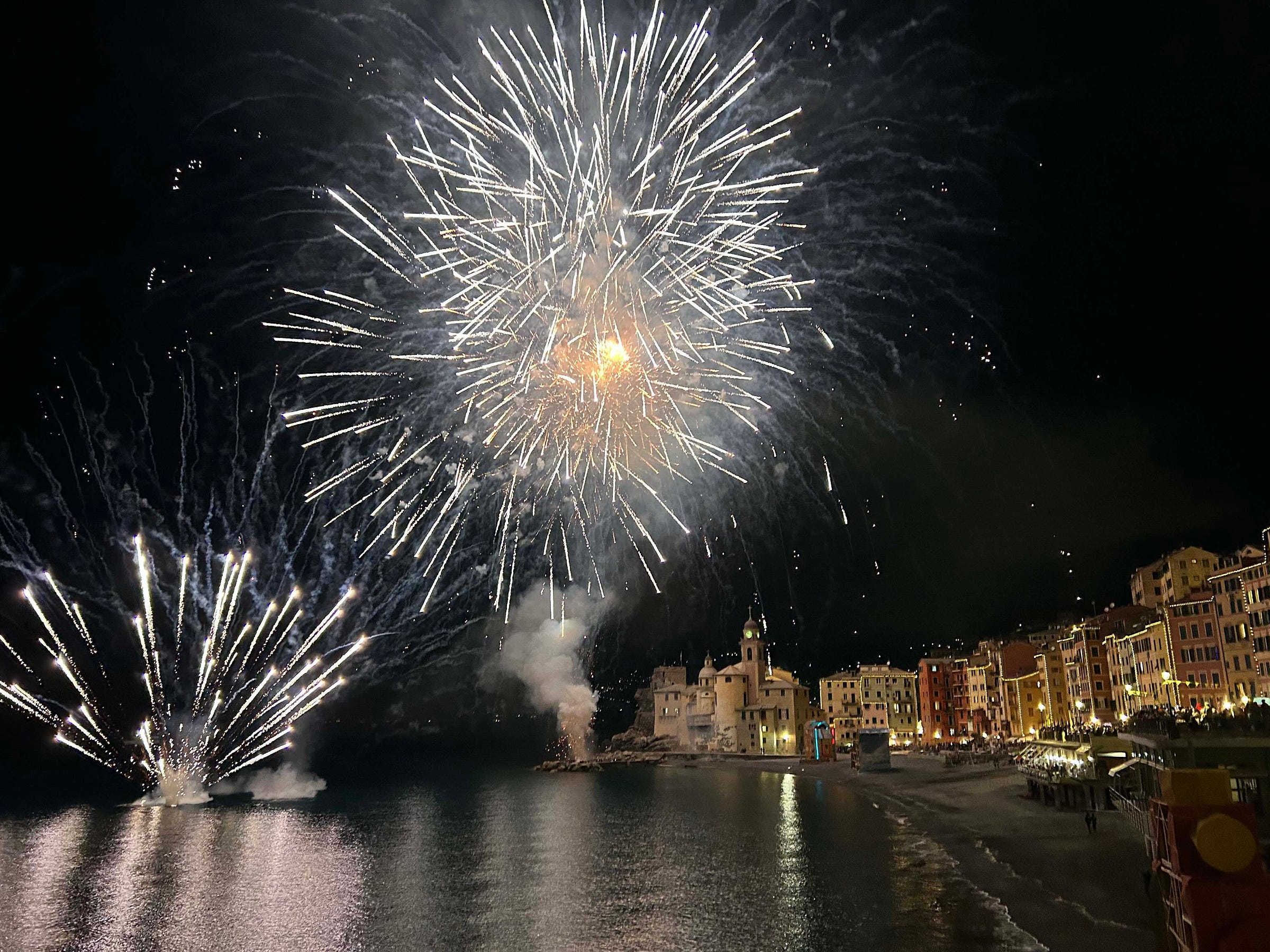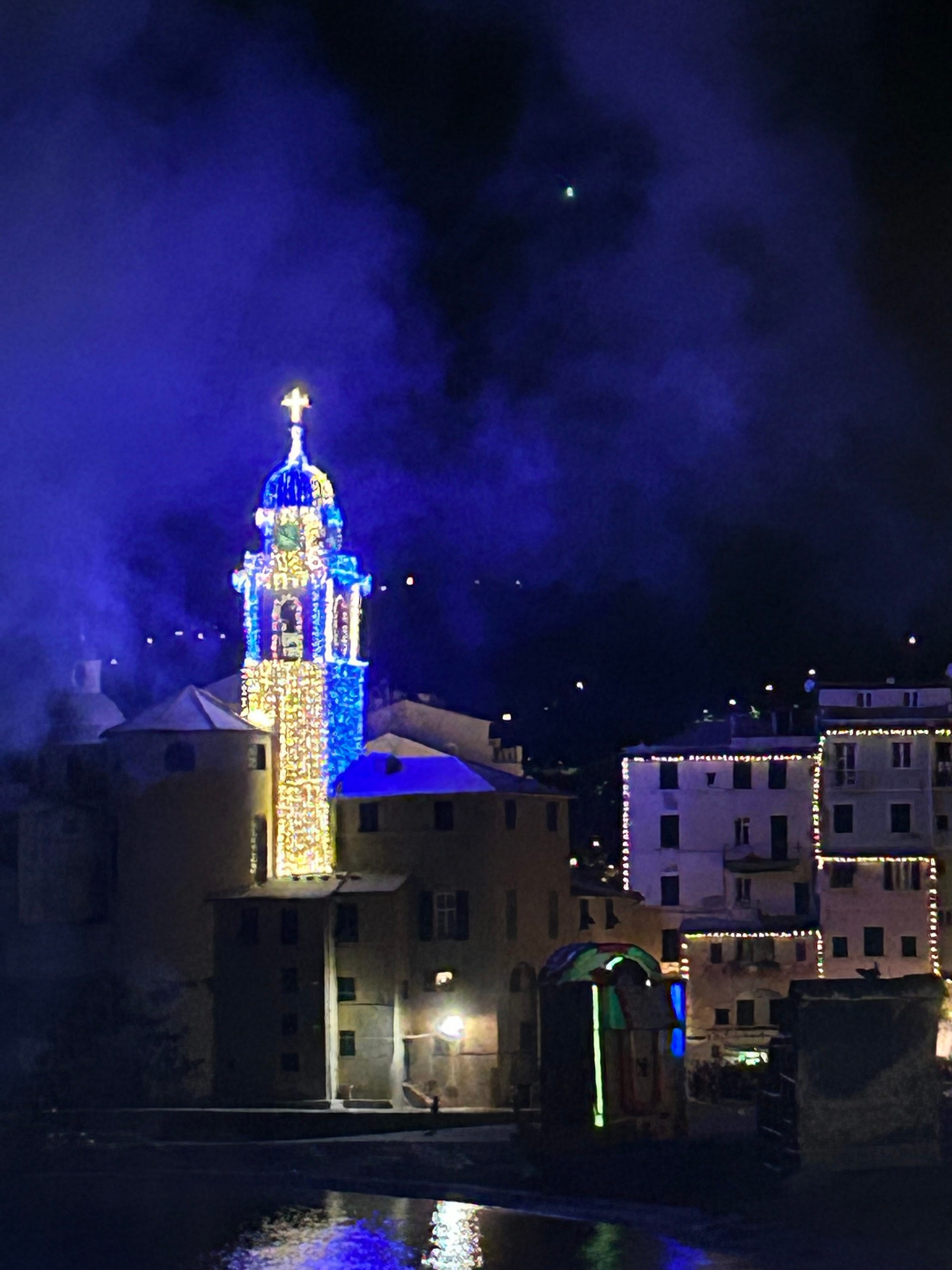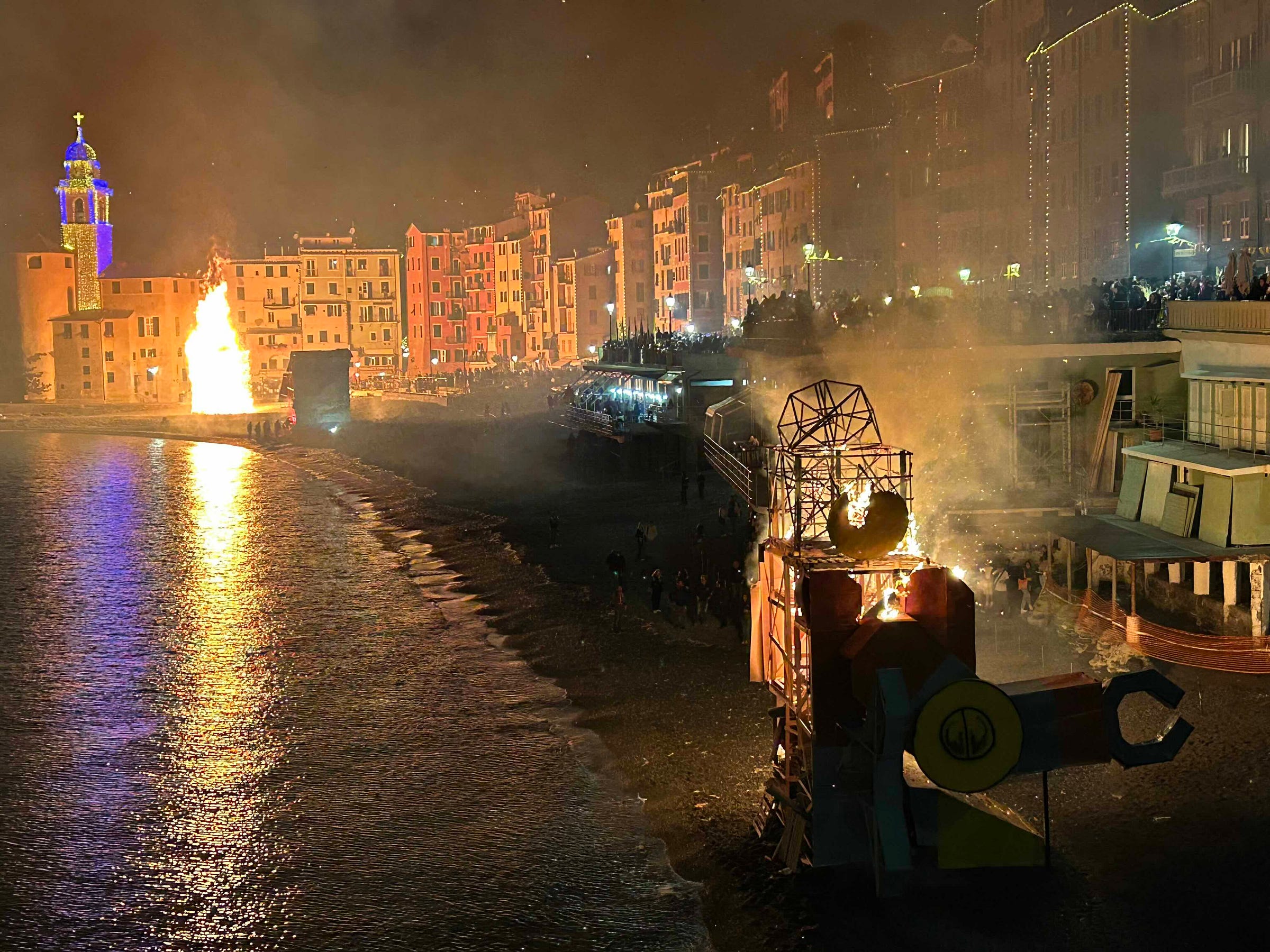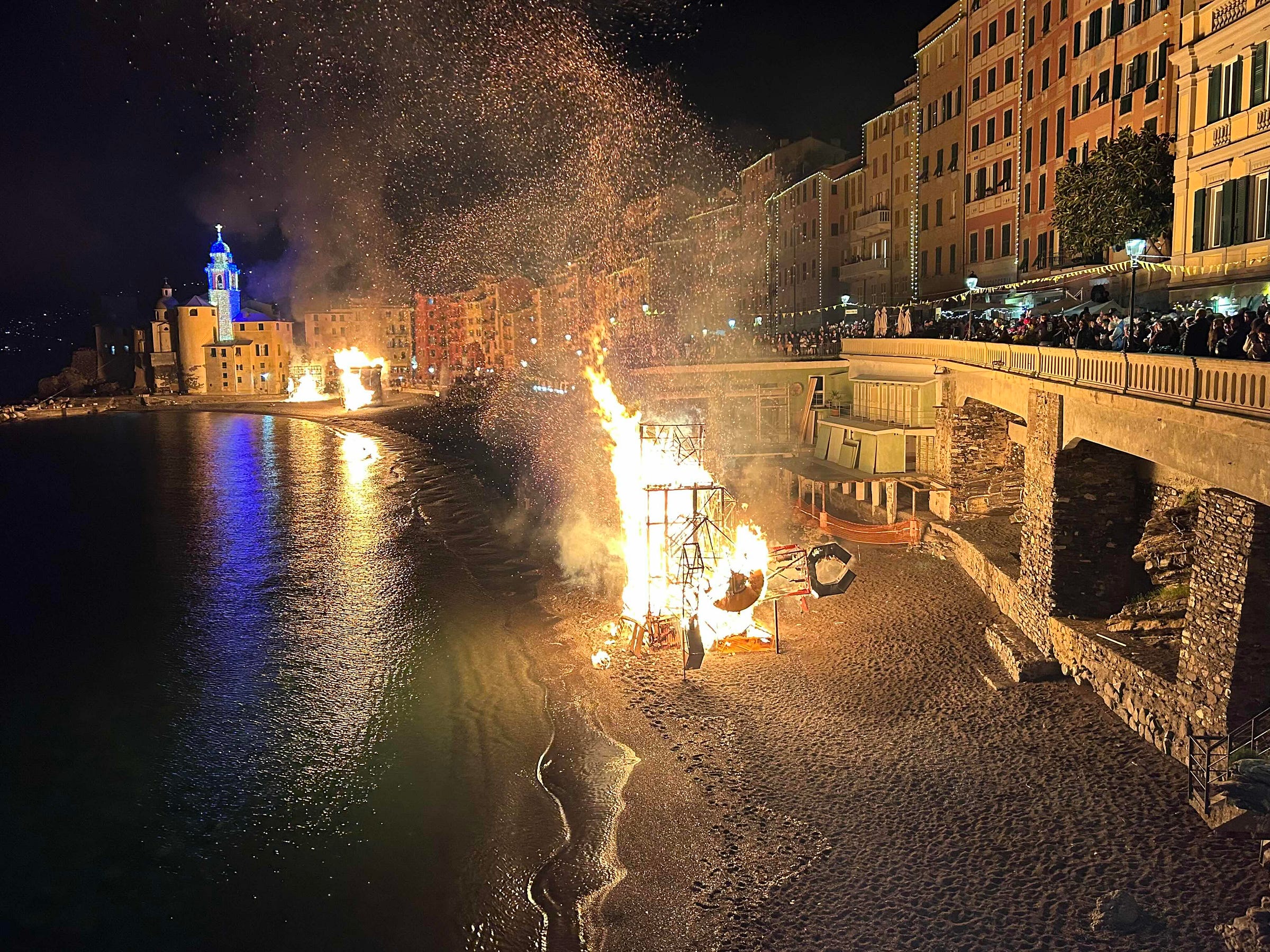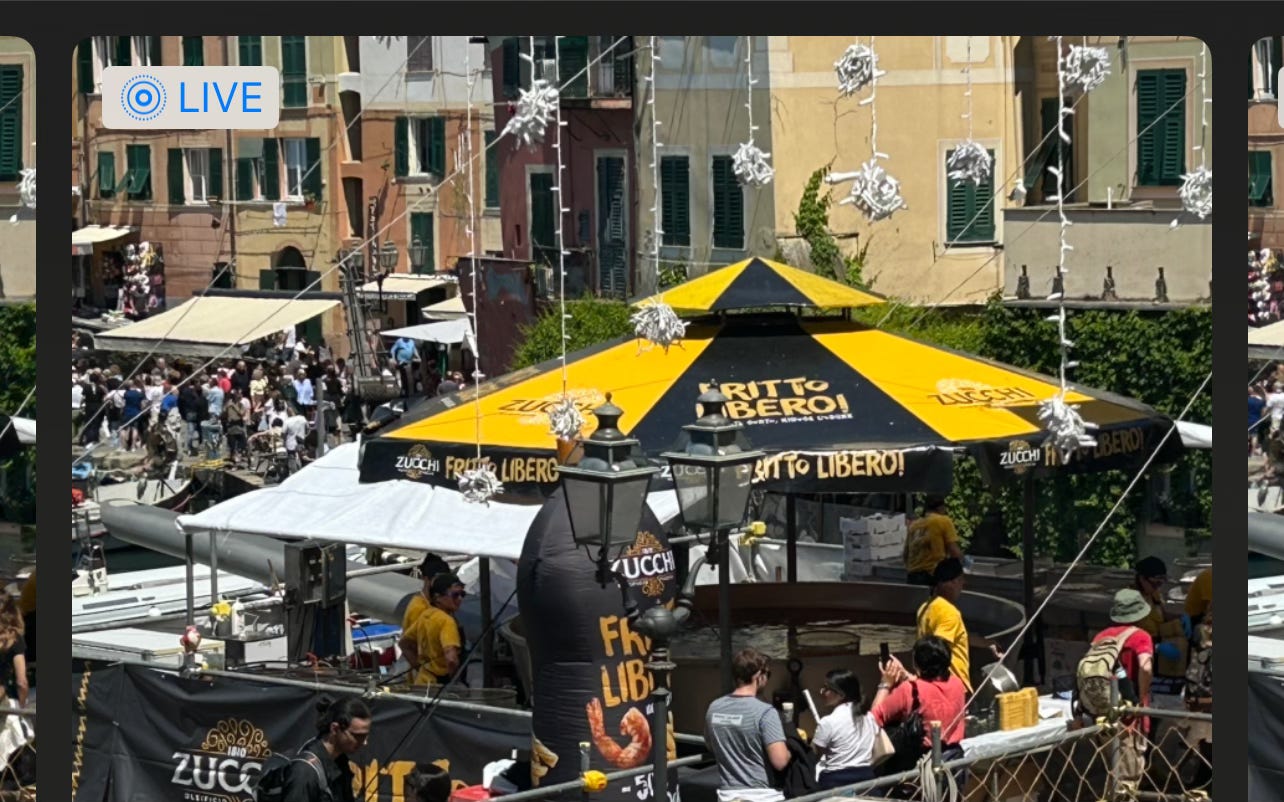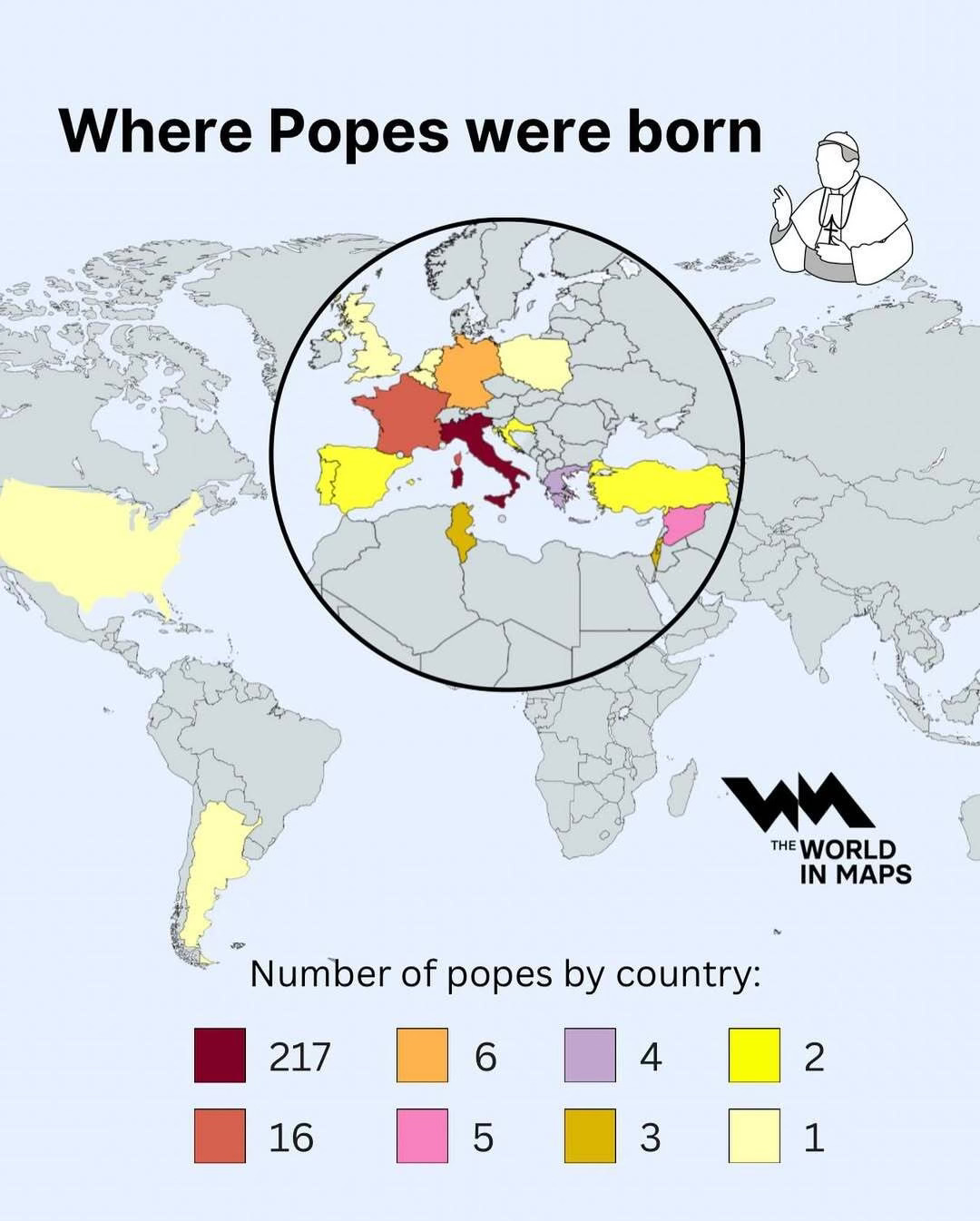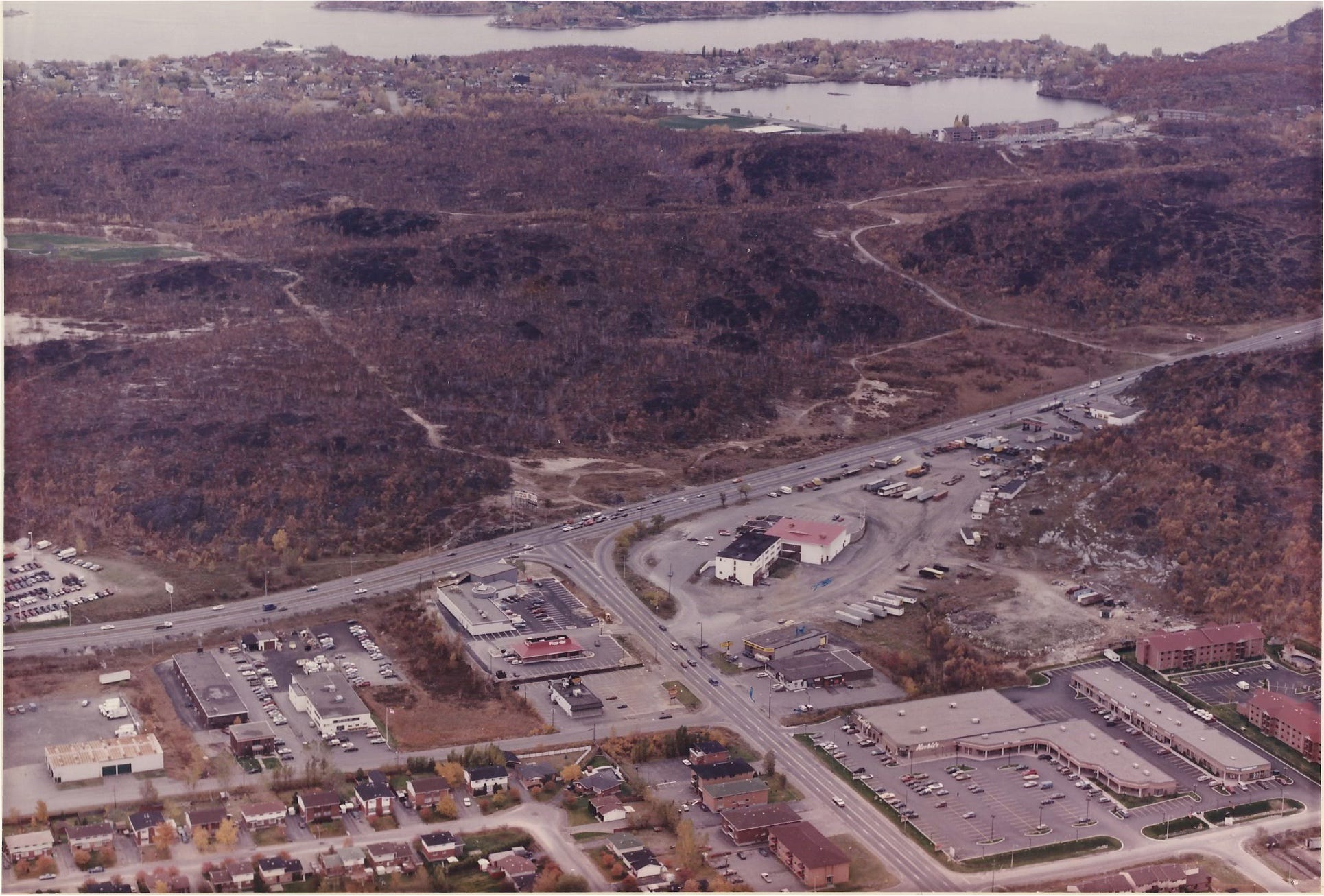Religious Processions and Secular Celebration and An Amazing Italian Immigrant to Canada
May 12 2025, Volume 6 # 6
A Religious Pagent
The procession takes hours to to through the town.
And a Pagan Festival
Across the Catholic Mediterranean there are religious parades at this time of year. In Camogli they celebrate Saint Fortunata, the patron saint of fishermen. It takes an entire weekend. The religious part begins with the procession through the town. It is hard to imagine just how many people pack the streets; tens of thousands in a tight space around the harbour and along the shore, known as the Lungo Mare.
Now to the pagan bit. Local groups spend weeks to build three giant, elaborate, wooden structures on the beach. It is a kind of contest. Here are this year’s.
The Robot
The Dolphins and the Wave
The Jukebox, for me the undisputed winner.
And they build them to burn them down after the fireworks.
There is a slight return to religion and the church and its cross are lit up.
The fires. The Jukebox went up first at the other end of the beach.
Then all three.
That was Saturday Night. This is Sunday morning.
People lining up for free fish cooked in that giant frypan that they trot out once a year.
Back to Religion: Where do Popes Come From
In a week that saw the first American Pope elected, here is a map of where the Popes were born. There was speculation an Italian would make it 218, but no.
Essay of the Week
This is a chapter about perhaps the most remarkable person in the book I wrote about the Dellelce family: Rachelina Dellelce, known as Lina, and the person responsible for the family’s success. These are three chapters that deal with her, so it’s a bit long. Dip in and out. A story of a business woman who might have only got to grade three.
CHapter 5
Rachelina Dellelce
Rachelina Dellelce was a remarkable woman whose drive and ambition contributed to the success of her children and grandchildren. She was born Rachela Masciangelo in the small town of Fossacesia in Abruzzi in 1912. She came to Canada in 1916 with her mother Ginevra, and her grandfather, to join her father Enrico who had sent for his family in Italy.
They settled, at first, in Copper Cliff, the town with the largest concentration of Italians in the Sudbury area. They then moved to a small farm in Markstay about 45 kilometres outside of Sudbury. Once Enrico accumulated enough money, he bought a boarding house in Sudbury, and that became the family business. That boarding house eventually became the International Hotel.
“My grandfather [Enrico] was a tough old guy. He opened up the first gravel pit and cement block plant in Sudbury. He opened it in Garson,” says Lina’s nephew, Ronnie Masciangelo. “My father worked with him, and they had trucks. I remember we used to go out there, and he would bring a lot of people over from Italy. He built a big apartment building on Kathleen Street, and that’s where we all lived, all on the same floor. He would help them come from Italy, he’d pay their way, and they would work for him. Then, one by one, all those people in the Donovan got to build their own homes.”
Rachelina was always known as Lina; the shortened version of her name even appears on the birth certificates of her children. As a child, Lina had a hard life. Her father was of the old school, and ruled the household like a tyrant, according to Theresa Olivier, Lina’s youngest daughter.
“She was treated badly from the age of three until eighteen, as I understand. She worked in the boarding house, she didn’t even graduate grade eight, and her father pulled her out of school. Stories were, that he used to hit her on the head with a pail, an abusive type. She could read and write, and he couldn’t,” says Theresa.
That changed in 1929, when she married Tom Dellelce. He was 18 years older, and settled, with a job as train engineer for Inco. Tom was a much kinder man than her father, and they had three children in the 1930s: Nicholas, Thomas Jr. and Genevieve, and then, what was like a second family, many years later: Peter in 1947, and Theresa in 1950 when Rachelina was 38 years old.
Rachelina may have been born poor, but she had no intention of staying poor. She and her husband, Tom, bought a truck, and they operated a small business on the side. At first, it was what we would call a dump truck, hauling gravel and other material, mostly to the mines, and then, they branched out into other vehicles. Ronnie Masciangelo, Rachelina’s nephew, says his father helped Tom and Rachelina buy the first truck.
Tom Dellelce Senior beside one of the trucks that was the start of the Dellelce Construction and equipment empire. This is a heavy-duty tow truck, bought when the business was firmly established.
He worked double shifts, driving the trucks when his job at the railway ended for the day. There was a lot of work for independent truckers, from carrying ore to carting gravel. By this time, the family had moved to Levack, another mining town in the Sudbury basin, as Tom graduated from fireman to locomotive engineer, shuttling trains between various mine sites in the Sudbury basin. That was 1947, the year Peter Dellelce was born.
Rachelina Dellelce, the hard working matriarch of the Dellelce family, with her two youngest children, Theresa and Peter, as toddlers.
About this time, Tom Jr. and Nick Dellelce started working for their parents. “Tommy was driving trucks full time first, waiting for Nicky to graduate from high school,” remembers Peter Dellelce. The business expanded and soon Lina’s daughter, Gen, was doing the books, as she would for so many of the family businesses all her life.
In the Italian tradition, Lina invested the extra money she made, not in the stock market or in bonds, but in property. She started buying houses, even developing small subdivisions in the Sudbury area. Her biggest real estate deals, the Sorrento Hotel and Naples, Florida, are detailed elsewhere. These real estate investments would make her a rich woman. Her grandson, Perry Dellelce, points out that if the family had managed its assets properly, the Dellelce’s would have been much richer.
“There’s a great business lesson here: we were a typical family business that didn’t survive the second generation. It’s sad because they had the opportunities. Paul Desmarais and Nick Dellelce were doing business in Sudbury and Robert Campeau along with Cliff Fielding, they were all Sudbury-based businessmen at the same time,” says Perry.
“They all did different things, but my family had as many, if not more, opportunities as Paul Desmarais did, in Sudbury and beyond. However, to survive generations in a family business, you have to bring in third party professional management, and he let go of some control. The Dellelce family didn’t. Things like that matter.”
By the mid 1950s, Tom and Rachelina Dellelce were more than comfortable. Though they were savers, they did splash out on small luxuries, such as trips to Mexico during the harsh Sudbury winter.
Dellelce Family Photo.
The prosperous tourists from Sudbury. Lina and Tom Dellelce on vacation in Acapulco, Mexico, on March 3, 1957.
Along with working hard at her businesses, Lina Dellelce was deeply involved in the local community. For many years, she volunteered for the St. John Ambulance, and she was a founding life member of the Caruso Club Ladies’ Auxiliary.
The child Rachelina pushed hardest was her first-born son, Nicholas, known inside the family as Nick or Nicky. She must have spotted in him the spark of her own drive to succeed.
“My mother’s favourite, let’s start with that,” said Theresa, in a friendly way, without a hint of jealousy. “Don’t forget she had him when she was eighteen. He was more her partner in life than my dad was. Whenever she had to talk about things, and decide on things, he was her go-to guy. She was very close to Nicky.”
Theresa, as the youngest, was very close to her father. By the 1960s, while Rachelina was out working, Tom Dellelce, now an older, sick man, was at home with his daughter, Theresa.
This is not to say that Tom Dellelce was not a hard worker. Though his wife Rachelina is often given credit for being the entrepreneur of the Dellelce clan, many family members point out that Tom Sr. worked two jobs at the start: train engineer and towing truck operator in his off hours.
Though Rachelina was a religious Catholic, her husband Tom was not. Rachelina made a couple of trips to Italy, one with her two youngest children, around 1960. It was kind of a religious pilgrimage organized by a priest from Sudbury, and they visited Lourdes and Rome, among other places. Peter Dellelce says he served mass, with some other boys, for Pope John XXIII, now a saint and the great reformer who brought in Vatican II.
Chapter 6
Naples (Florida)
Rachelina Dellelce had a love affair with Naples, Florida. Her husband, Tom, discovered the town with the familiar Italian name by chance, but sharp-eyed entrepreneur that she was, Rachelina grabbed the opportunity to buy land, and develop property in what was then a neglected part of Florida. She bought land, some of it vacant lots, for as little as a few hundred dollars.
“Some of those properties were next door to where the Ritz Carlton is now. My mother owned a little commercial mall and the developers of the hotel had to buy her out as part of putting together the land for the project,” said Peter Dellelce.
Rachelina worked in local hotels in Florida in the winter to earn cash to finance labourers that she brought down from Sudbury to build houses. The Dellelce family today still has some of the properties she acquired.
Chance can play a big part in life and the Dellelce family’s Naples adventure had a serendipitous start.
In the late 1950s, Tom Dellelce and a few friends decided to fly to Argentina to look for members of his family, including his brother, who had emigrated to South America around the same time Tom came to Canada, during the First World War. There was a stopover in Miami before the long flight to Buenos Aires, and Tom and his friends had some time to kill.
They went to the racetrack and got lucky, and somehow or other managed to spend a chunk of their winnings—several hundred dollars at the time—buying a piece of property, sight unseen, near what is now Vanderbilt Beach in Naples, Florida. Tom Dellelce, and his friends from Sudbury, then continued their flight to Argentina. They found the brother, and years later, so did a schoolteacher who taught two generations of the Dellelce family in Sudbury, when she ran into a Dellelce while on vacation in Argentina, and then connected the two. Quite a coincidence.
Stories about buying swampland in Florida don’t usually have a happy ending. This one did. The man selling the land was a member of the legendary Vanderbilt family, so he wasn’t a fly-by-night Florida land developer. A few years after buying the vacant land, Tom and Rachelina went to Florida to take a look at it. It wasn’t swamp; it was near a beautiful natural stretch of beach in one of the warmest parts of Florida. You can only go a few miles south before the land ends on the west coast of the state, which is why, today, Naples is one of the wealthiest places in Florida.
Tom and Rachelina built their first house in Naples in the late 1950s, and their youngest children, Theresa and Peter, remember flying down there in 1960, when she was about 10, and he was 13. Tom was not well then; a heart attack had slowed him down, though he lived for another 15 years, dying in July of 1975. During this period, he enjoyed relaxing in the sun, but Rachelina was a ball of energy.
“My mother got very bored. She bought more property and literally started building houses by hand. She’d bring people from Sudbury to stay at their house, and she’d feed them, whether it be a carpenter or a painter or an electrician, and she’d have them help to build the houses,” recalled Theresa, who was in boarding school, back in Canada, at the time. “There was so much empty property. It was literally a trailer park. That’s why it’s called Naples Park.”
On a warm winter day in sub-tropical Naples, Theresa gives a tour of the properties her mother built, and properties she owned. Rachelina owned a long stretch of beach next door to the property where the Ritz Carlton Naples Resort now sits.
“She owned property on the beach, and she bought a grocery store that used to be over there,” said Theresa, on slow tour of the neighbourhood near the bungalow where she and her late husband used to spend the winter months. “She wanted my brother Tommy to come down and run the store, but he said no, so she sold it for next to nothing.”
Rachelina made a lot of money buying and selling properties in Florida. Her children say she had a vision of the future, and could see that Naples would be a major drawing card for people from the north. Two very different people picked Naples as an up and coming location: the daughter of a poor Italian immigrant from Abruzzi, and the scion of the Vanderbilt clan, one of the richest old families in the United States.
Today, you can sit at the marina in Naples and watch the private jets come in, one after another. It is now one of the richest places in Florida and indeed in all of the United States. Rachelina Dellelce spotted its potential early.
“The money she made went into a mattress. I don’t think any of it ever went into a bank,” laughed Theresa. She was also generous to her children. “My house (the lot) was given to me as a graduation present. I’ve still got the bill for it; she paid $450. I rent that house out now.”
On a rainy day in Florida, Peter and Theresa sit together and talk about their mother’s deals in Florida. There were so many of them that they seem to run together in their memory.
“She bought lots all over the place, some right in Naples. She was an opportunist. She would put a low offer in, and if she got it, she would put a house on it and sell it, an amazing entrepreneur,” says Peter Dellelce.
Theresa jumped in. “But she had four or five other lots, she had the lot by the graveyard, which she sold. She had vision, but she also had guts. She was my age when she did some of those things. Could I do them? I don’t know. She had a lot of guts, and she was a gambler.”
Theresa related how her mother used to love going to auctions at a Florida auction house that specialized in estate sales, including things such as rugs and jewellery. Rachelina loved the game of the auction, and once she set her mind on an object, would often bid until she got it, whether she needed it or not. She passed this trait on to her son Nick, who would bid on heavy equipment at auctions in Ontario, buying things that he would figure out how to use later.
As Tom and Rachelina Dellelce got older, they started to spend more time in Florida, leaving in late November or early December, and staying for three or four months. By the late 1960s, the Sorrento Hotel and other operations were being run by their older children, Nick, Tom and Gen. They would often make the trip in a pickup truck, loaded with supplies, some of them not able to pass muster at the border.
“One Christmas, my mother and I were driving in this brand new Rambler Marlin from the Scagnetti’s dealership, and we got to the border with the liquor and the beer, and they poured it all down the drain because she got caught,” remembers Theresa, who was 14 or 15 at the time.
The Rambler Marlin was a “muscle car” and the young Peter Dellelce, who had just got his driver’s licence, was caught speeding 50 miles away from Naples. The Florida police said he would have to spend the night in jail since his mother didn’t have enough American money to pay the fine. A call was put in to Tom Dellelce, but by this time, it was late on Christmas Day, and he was so annoyed that everyone was late, and just hung up the phone. Rachelina managed to spring Peter by leaving all her Canadian cash, and promising she would return with American money the next day.
After her husband’s death in 1975, Rachelina splurged and bought a Cadillac that she drove back and forth to Sudbury. She was a rich woman by this time. She rolled the Cadillac on one trip and bought another one the same colour so no one would know about the accident. But, someone did know, since they told the story 40 years later. It was about this time that she started her second youth and had a boyfriend or two.
*
Theresa Olivier doesn’t spend as much time in Naples as she used to, since her husband, Alex, died in 2000. Her daughter, Christa, lives in the neighbourhood full time, but Theresa wouldn’t be there at all if her mother had decided to stay at home in Sudbury, and never start her adventure in Naples.
“You wonder how my mother did all that tedious work with no cell phones, no faxes, no e-mail?” asks Theresa on a drive in the Naples neighbourhood where her mother built her first houses in Florida. “How did she do all that? In those days you had no telephone, you had to go to the corner to use the pay phone.”
“The very first house was down the street…the very first house on this street. Then there were three or four other houses she built on this street and then she built her own, a nice one on the end, more toward the beach. She built a place on the water on Seagull Avenue.”
One Florida myth held by some members of the Dellelce family is that Rachelina owned the land on the beach near where the Ritz Carlton now stands. She did own land on the beach, but not where the hotel stands.
“If you go down Vanderbilt beach here, there’s a popular restaurant, and she owned all that property, and there was a grocery store, a little kind of quick mart or something, and she had bought it, and she wanted Tommy to move down here and run it, but Tommy refused. Let me tell you an interesting story why Tommy refused. Tommy was very dark-skinned, and his wife very light-skinned, and when he came down here on his honeymoon, they put him in the back of the bus, and they wouldn’t let him use the washrooms, so when she wanted Tommy to move down here, he said ‘I’m not moving down there’.”
“So she sold it. Now, that would have been worth millions today, but she sold it, and I don’t even know if she made a profit or not. Then, when you go up to this corner where the graveyard is, she owned all the property across the street. She owned a lot of property in this park,” said Theresa sitting by the pool at her house in Naples.
Rachelina married again, a few years after Tom’s death. His name was Rocco, and he was a stonemason. Rachelina not only found herself with a husband, but a man who could do valuable work, especially building houses in Sudbury and Naples. The marriage, however, didn’t last that long.
“I always liked Rocco, and he used to say to me, “Work, work, work…I thought we’d have it nice and easy, and go away and travel but no, work, work, work,” recalled a family member. “They did separate, I think. It wasn’t a good situation I don’t think. Rocco passed away before my mother.”
Chapter 7
The Sorrento
The Sorrento (with the black and red roof) from the air, several years after it was built. It was the first building in the area.
Rachelina Dellelce was the most entrepreneurial member of the Dellelce clan. She started with nothing, and amassed substantial assets, first in Sudbury, then in Florida. More than just a businesswoman, she was active in local charities, and also helped many Italian immigrants get a head start in their new country. She was an inspiration to her children, grandchildren and great grandchildren, all of whom still hold her in awe.
“She brought people in from Italy, and to pay their dues, they worked labour, and that’s how they reimbursed each other back in the 1940’s and 1950s,” remembered Peter Dellelce, her youngest son.
Those sponsored workers, most of whom stayed on in Canada, were given a reward at the end of a week of labour.
“Every Sunday, she’d load two half ton trucks with all the Italians in the back, and take them, along with food, music, accordions, and wine, and these Italians would work at the (Vermillion) camp, then party and drink, then back on the truck home. It was a reward for the work they did all week. They’d play bocce, she’d cook and they drank all homemade wines by the gallons. It was fun, it was like they were all back in Italy,” remembered Peter.
The Sorrento Hotel, in Sudbury, was her core asset, and she used the money she made there to build tracts of housing in Sudbury, and to develop properties in Naples, Florida. She and her husband, Tom, worked hard, and saved their money. A look at a savings book from the Bank of Commerce in Sudbury (see illustration on page 35) showed the couple made regular deposits, and amassed a considerable nest egg. Like most immigrants, they valued land, and in 1960, they made one of their shrewdest investments, buying raw land at what is today the busy corner of The Kingsway and Barrydowne Road.
“The Kingsway was only a two-lane gravel road and Barrydowne Road was still gravel covered. It was barren bush, with the occasional moose passing by,” Rachelina told the Sudbury Sun in the spring of 2000. She took a chance, and built her hotel on undeveloped land in an area now known as New Sudbury, the modern commercial and shopping centre of Greater Sudbury.
Rachelina’s second son, Tommy, was the one who came across the land on the edge of the city. “Tommy is the one who found the property for the Sorrento Hotel,” said his younger sister, Theresa Olivier. The family had been thinking of buying another hotel before the idea of building a new one.
“There was another hotel that went for sale closer to town, and it was the big event, she wanted to buy this Laurentian Hotel. It was smaller, and in a little more populated area,” remembered Theresa. “My father refused and then, the next thing you know, Tommy found this property, and the Sorrento was built. Tommy helped with the construction of it, along with my father.”
Rachelina opened the hotel in 1963 and people said it would never be a success: it was too far out of town; it was competing with established hotels in the centre of the city; and, it was thought an immigrant with little formal education wouldn’t be able to make a success of a hotel on the edge of the northern frontier.
How wrong they were.
The Sorrento was a success from the start. The name came from a town in Italy, though one far away from the town of Rachelina’s birth. The hotel was a fair size, and had the largest banquet hall in the city, at the time. The owner did all the cooking for the first decade or so. Sudbury was a white-bread town in the food department, and Rachelina Dellelce helped change that. Not only was there real, Italian cooking, she also introduced pizzas to Sudbury, and that alone kept the restaurant full.
Travelling salesmen flocked to Sudbury in the 1960s to supply, not just Inco and Falconbridge, but also the growing retail sector, as Sudbury morphed from a mining town into a regional capital. The hotel had 42 rooms, a dining room, and the largest banquet hall in Sudbury at the time. It could hold well over 500 people for weddings and the like, and in a pinch, they could squeeze in even more.
“I remember the first banquet we had. The banquet hall’s kitchen wasn’t ready, so we had to carry food, and there were about 28 steps to get to the kitchen upstairs and we served hundreds of people down there, carrying the food and the dishes up and down,” recalls Theresa Olivier, who was a teenager, and still in high school at the time.
While the downtown hotels offered rooms and restaurants, the Sorrento soon boasted entertainment, and not just local bands. Rachelina Dellelce’s hotel became the entertainment capital of Northern Ontario and everyone from Liberace to Johnny Cash played there, and the Canadian superstar Shania Twain sang at the Sorrento early in her career.
“We used to have a line up right out to the highway whenever we had these top entertainers come in,” said Theresa Olivier, who operated the hotel for a while. “Depending on the week, either the lounge or the banquet hall was the biggest earner.”
Theresa recalled that her brother, Tommy, and her sister, Gen, booked many of the acts. He would visit other hotels and bars, and do research, which was tougher to carry off in the days before you could Google everything. Gen worked in the office and Tommy was the manager at the time, working 12 to 14 hours a day. “He worked very hard at the Sorrento. He could cook, and if he had to, he served the banquets with the rest of us.”
There were many stories about various celebrities. Johnny Cash didn’t pay his hotel and bar bill. Tommy Dellelce drove to North Bay and collected the tab.
“He was drunk as a skunk, and forgot to pay his bill. It was just a drunken oversight by Johnny Cash,” said Tommy’s widow Terry Dellelce.
Peter Dellelce chauffeured Liberace around for a week, and for years didn’t believe the flamboyant performer was gay. There were a lot of up-and-coming stars; no one at the top of their game was playing Sudbury. Not every one of them was popular with the family. “I remember K.D. Lang. She was mean. She wanted this, she wanted that, she was demanding,” said Theresa.
One of the most bizarre residents of the hotel was Charles Ng, a mass murderer who was on the run from authorities in the United States. Some members of the family vaguely remember speaking with him during his stay in 1985. The FBI was on his trail, and when the police arrived at the Sorrento, Ng had already left town on a Greyhound bus. Luckily, there were no violent incidents while he was in Sudbury. Eventually, he was captured and extradited to the United States. He is still sitting on death row in San Quentin prison in California.
“Tommy (Jr.) was the one who was instrumental in getting him caught. Tommy was running the hotel, and he became suspicious. This Charles guy was paying cash for his room, and Tommy would drive him to get supplies. Tommy talked to him and did his own private detective work and went to the police and then he was arrested,” recalls Peter Dellelce.
Another notorious group of visitors were two motorcycle gangs, one from St. Catharines, and the other from Sudbury, who picked the Sorrento as a place to do battle. A few shots were fired, but no one was hurt. The police got things under control, but the local jail was overflowing with bikers, so they had to be put up at the Sorrento, unarmed and under guard.
Tommy Dellelce was on duty that night, and quickly got the staff out of harm’s way and sent everyone home.
“These bikers all got interviewed, and stayed over in the hotel, and it was a big story in the Sudbury Star. They were all in the dining room, and I had to help my dad serve them,” recalls Cara Tymchuk, Rachelina’s granddaughter, and Tommy Dellelce’s daughter.
One thing the bikers did not get was one of the famous pizzas from “The Toe,” a local nickname for the Sorrento.
“My grandmother’s pizzas were to die for, and she used to sell them in the beverage room, and I think they were a dollar. At the end of the night, if you were lucky, you could buy a whole tray for next to nothing. People still talk about Mama Dellelce’s pizza, and she is still referred to as Mama Dellelce,” said Cara.
Cara worked at the Sorrento for six or seven years, but her mother, Terry Dellelce, a quiet Irish-Canadian woman, found it a difficult place to be.
“I worked a little bit at the desk at the Sorrento when it first opened, but that didn’t last. It’s hard to work with an Italian family,” said Terry in a friendly way. The reason: “Well they’re bossy for one thing, but it was better for me not to be there.”
Perhaps a reason for that was that Rachelina Dellelce wanted all her children to marry Italians, according to Theresa Oliver, whose husband was a Francophone. That prejudice applied to Terry Kiley, the Irish woman who married Tommy. “You can’t imagine the things she did to stop both marriages,” said Theresa.
Many of the people who worked in the hotel were immigrants, but not all of them were Italian. One who worked at the hotel was George Trebek, a chef who came to Canada from Ukraine. Trebek’s son, Alex, left Sudbury for Toronto, then went to the University of Ottawa, the CBC, and then, became the host of the legendary television game show, Jeopardy, when it was revived in 1984.
“My father was very fond of Rachelina Dellelce and loved his time at the Sorrento,” said Alex Trebek during a chance meeting with the author at a dinner in Los Angeles.
The Sorrento was truly a family business. Tom Dellelce Jr., Nick’s younger brother, was a trained mechanic, but soon after the hotel opened he became the manager while his sister Gen did the books. Tom, who died on December 28, 2013, was a soft-spoken man, the opposite of his older brother, but he was outgoing and loved people. It was his job to book the big name acts, and he was good at it. He was also devoted to the hotel. In 1973, when the hotel expanded, Tom Jr. was in charge of construction.
The Sorrento provided work for people in the extended Dellelce family. Folly Markle, Nick Dellelce’s sister-in-law, worked on the front desk for a while. She remembers the hotel was popular with travelling salesmen, and it catered to them. Folly also admired Rachelina’s work ethic.
“She was a hard-working woman. The nights I was there she was making pizzas, and selling them in the bar. She was a busy woman.”
The pizzas were a big draw, not just for the hotel guests, but also for people from all over Sudbury. They were a real money maker and family lore has it that Mama Dellelce stashed away the cash from the pizzas she sold at the Sorrento, and used that money to finance her developments in Florida.
Mama Dellelce rocking at the Sorrento.
Later in the Sorrento’s history, Rachelina was too busy with her other projects, both in Sudbury and Naples, Florida, so she left the running of the hotel to her two daughters, Gen and Theresa. By that time, Theresa’s husband, Alex Olivier, was running another family hotel, the Plaza, on Minnow Lake in Sudbury, and Tommy Dellelce was back at the garage that had moved just up the street from the Sorrento. As a master mechanic he was needed to certify vehicles.
Harry Cacciotti worked for Nick Dellelce during his student days and, since he was a young man the whole family trusted, he was assigned to look after the Sorrento on a part-time basis.
“Nick came to me one day while I was on my work term in the later part, and said, ‘my sisters need help at the Sorrento, they want you to close two nights a week for them’…. go and see Genevieve. I went to visit them, and they said they were tired of closing six nights a week, they were doing three and three I suppose splitting it between the two of them,” remembers Harry.
One of the most important tasks in a cash business is to keep a sharp eye on the money, and on bartender tricks, such as bringing in their own bottle and selling it instead of the house booze supply. Harry remembers catching a bartender selling four bottles of his own vodka on a shift.
“My job was to watch the tills, and to put the money into the safe at the end of the night. Before long, I was closing four nights a week and they were closing one each,” said Harry. “And if I wasn’t at work at seven in the morning, Nick would say, ‘where were you, what’s the matter with you. Can’t get up?’ Meanwhile, I had worked until two or three the night before.”
For a while, the Sorrento had strippers. Part of Harry’s job was to interview candidates, not a bad line of work for a 21-year-old.
Rachelina Dellelce was away during this transition, but when she returned, she walked in to see naked women on the stage. She was outraged, grabbed a broom, and chased the dancers off the stage, and barred them from the hotel. Soon afterwards, the lounge at the Sorrento reverted to a country and western bar. The Dellelce family sold the hotel early in 2000.
The hotel was demolished and replaced by a commercial building, though Benita Dellelce’s Charm Plus operation [remained?], and she operated her salon there for nine and a half years. For a long time, the Dellelce family owned the land, and leased it out, but the land was sold in 2013. It was redeveloped in 2016 and Benita left, severing the long family connection.
It wasn’t the first time the property was sold. Rachelina sold it to a Sudbury family, but she had seller’s remorse. Every time she drove by the place, she regretted letting it go. So she bought it back.
“It shows her stubborn streak and how she couldn’t give up the place she had built,” said Benita.
The place was sold again to a REIT (Real Estate Investment Trust). But, they misjudged the state of development on the Kingsway. It was too early for what is now prime commercial property. The REIT asked the Dellelce family to run the Sorrento to keep the hotel running until they could secure tenants. The hotel became run down. Eventually it was sold. However, Rachelina bought it back again, and ran it for a few more years before finally letting it go.
Rachelina Dellelce, the immigrant child who barely finished primary school, left a lasting legacy: her prosperous, and self-confident family who know that because of what she accomplished, there is no limit to what they can do.
There were many other members of the family who worked at the Sorrento. Eddie Zanetti, Gen’s husband, and Lina’s son-in law, had a prominent role there as general manager.
“My grandmother used to call him King George for some reason,” laughed Francis Zanetti, who also got his start in the family hotels in Sudbury, and who now owns and operates a huge restaurant and bar in Hamilton called Tailgate Charlie’s.
One of Lina’s favourite nephews, Ronnie Masciangelo, remembers dropping in often.
“I loved her. I used to go to the Sorrento Hotel where she worked, and get pizza from her. Auntie Lina and I were very close,” remembers Ronnie. “She used to call me all the time to bring her the manure from the farm for her gardens. When I was small, I used to play at the house all the time with Peter. He and I grew up together. We are the same age: he was born in May and I was born in July. I was nine months older than him.”
Alexander Olivier, known in the family as Lexi, says his grandmother’s true genius was spotting a market that screamed out to be filled. She bought other small hotels in Sudbury, or helped family members acquire them, including the Park Lane, the Ledo and the Plaza, which Lexi still runs.
The Plaza sits in a neighbourhood of small houses built by Inco to house its workers. But Sudbury has changed; there are tens of thousands of fewer workers in the automated mines, and the old workers’ houses are now privately owned. In the old days, Stompin' Tom Connors had a song called Sudbury Saturday night with the refrain:
Yeah, the girls are out to bingo
And the boys are gettin' stinko
And we'll think no more of Inco
On a Sudbury Saturday night
“The boys would all get stinko, and it was socially accepted; your wife wasn’t angry and the police wouldn’t nail you to the cross. There was a big work hard and play hard society here,” says Lexi. “My grandmother profited off that by having all these establishments with licenses where she could sell alcohol. It was a win-win. Sudbury has changed that way though. It’s not socially accepted anymore. Their lifestyles are too busy and maybe their better halves or families wouldn’t accept them coming to have drinks regularly anymore. You have to watch carefully with the driving, because you’re a criminal if you drink and drive.”
One thing Lexi remembers about his grandmother Lina and the lessons he taught her at the Sorrento: “She was an aggressive entrepreneur, hard core and strong-willed.”
The Oliviers lived next door to their grandparents growing up, and Lexi started helping out at the Sorrento when he was eight years old, then worked there as a teenager. He laughs as he recalls the hard lessons she taught him.
“Once, she slid me a piece of apple pie, and asked me if I wanted a scoop of ice cream with it, and I agreed, and on Monday when I got my paycheque, it said ‘one slice of pie, minus $1.45 and one scoop of ice cream minus $0.65’ right off my pay. That’s my grandmother. So I was upset about that and on my next lunch break, she asked if I wanted a piece of pizza or a nice piece of pie with ice cream like last time. I said, “I don’t want anything.” Oh yeah, she was something,” laughs Lexi.

